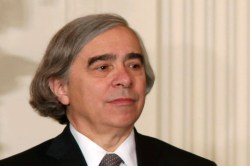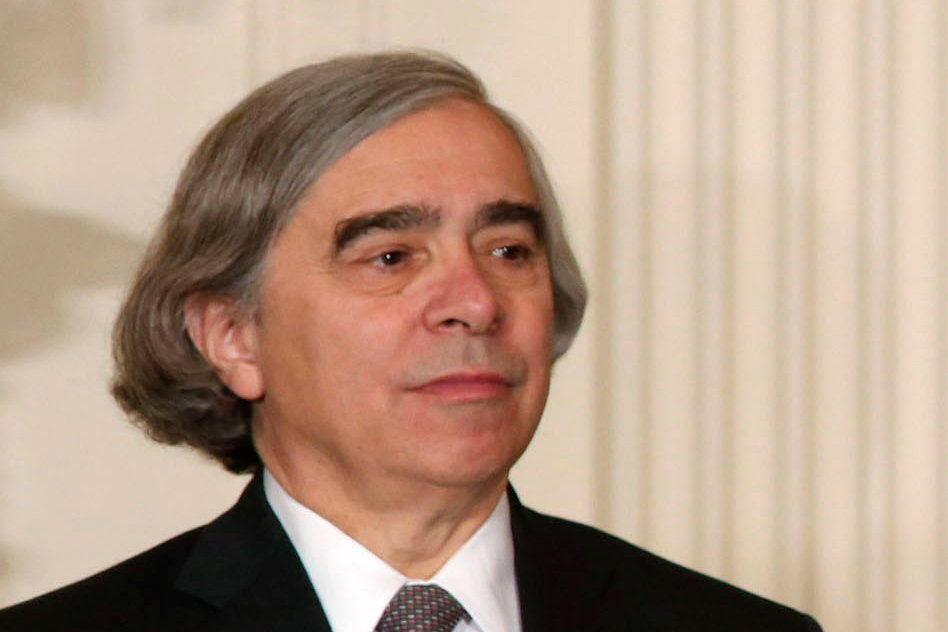
ReutersHe keeps some questionable company.
The Republican minority in the Senate loves to obstruct confirmation of President Obama’s Cabinet nominees, but it isn’t saying boo about the man who appears set to become the nation’s next energy secretary.
That might be because Ernest Moniz has friendly relations with a number of dirty energy companies — the kind of companies that generously fund so many senators’ campaigns.
President Obama’s pick to become the nation’s next secretary of energy is drawing criticism for his deep ties to the fossil fuel, fracking and nuclear industries. MIT nuclear physicist Ernest Moniz has served on advisory boards for oil giant BP and General Electric, and was a trustee of the King Abdullah Petroleum Studies and Research Center, a Saudi Aramco-backed nonprofit organization.
Moniz also directs the MIT Energy Initiative, which gets significant corporate funding from BP, Saudi Aramco, Shell, Chevron, and a number of utilities that operate nuclear plants.
At the same time, Moniz has stressed the importance of moving away from coal and has promoted and called for more funding for renewable energy and energy efficiency. That’s earned him praise from the Natural Resources Defense Council. But other environmental and watchdog groups are campaigning against his nomination because of his industry ties.
ProPublica reports on those ties:
[B]eyond his job in academia, Moniz has also spent the last decade serving on a range of boards and advisory councils for energy industry heavyweights, including some that do business with the Department of Energy. That includes a six-year paid stint on BP’s Technology Advisory Council as well as similar positions at a uranium enrichment company and a pair of energy investment firms.
Such industry ties aren’t uncommon for cabinet nominees, and Obama specifically praised Moniz for understanding both environmental and economic issues.
Still, Moniz’s work for energy companies since he served in President Clinton’s Energy Department has irked some environmentalists.
“His connections to the fossil fuel and nuclear power industries threaten to undermine the focus we need to see on renewables and energy efficiency,” said Tyson Slocum, director of the energy program at the consumer advocacy group Public Citizen.
Slocum pointed out that Moniz, if confirmed, will set research and investment priorities, including at the department’s network of national laboratories.
The Energy Department hands out billions of dollars in contracts and loan guarantees as it pushes energy research and development and administers the nation’s nuclear weapons stockpile and cleanup efforts.
Moniz is also coming under criticism for a big report on natural gas released by the MIT Energy Initiative in 2011. It called the environmental impacts of fracking “challenging but manageable,” endorsed natural-gas exports, and talked up gas as a “bridge fuel” that could help the country move away from dirtier fossil fuels and toward clean energy (a controversial notion).
The Public Accountability Initiative, a watchdog group opposed to fracking, has been particularly critical of that 2011 report and its authors and funders:
MITEI and the study’s authors presented the study as independent, but did not disclose its authors’ significant financial ties to the oil and gas industry. … The MIT report … failed to disclose that a study co-chair, Anthony Meggs, had joined gas company Talisman Energy prior to the release of the study. Another study group member, John Deutch, has served on the board of the LNG company Cheniere Energy since 2006 and owns $1.4 million in Cheniere stock.
The PAI study also notes that the MIT study was funded by oil and gas industry sources, including a foundation closely linked to Chesapeake Energy. … The study was also advised by a committee dominated by oil and gas insiders.
The Senate Energy and Natural Resources Committee will hold a hearing on Moniz’s nomination on April 9. He’ll have to release a financial disclosure form by then, so we’ll soon learn more about how much money he’s made advising and consulting for energy companies. He’ll also need to submit an ethics agreement describing how he would avoid conflicts of interest.
A few Democratic senators might toss him hard questions at the hearing, but don’t look for Republicans to put up much of a fuss. Overall, Moniz is expected to be easily confirmed.




